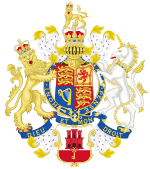
Gibraltar elects on the national level a legislature. The Gibraltar Parliament has 17 members, all elected for a four-year term in one constituency with each voter getting to vote for their selection of ten candidates. Gibraltar forms a single constituency but voters have only ten votes. Hence the electoral bloc with the most votes will normally get ten seats and the runners up seven.

Sir Joseph John Bossano is a Gibraltarian politician who served as Chief Minister of Gibraltar from 1988 to 1996 and Leader of the Gibraltar Socialist Labour Party from 1978 to 2011. He served as Leader of the Opposition from 1984 to 1988 and 1996 to 2011.

The Association for the Advancement of Civil Rights (AACR) was a political party in Gibraltar.

Sir Joshua Abraham Hassan, nicknamed "Salvador" (Saviour), was a Gibraltarian politician, and first mayor and Chief Minister of Gibraltar, serving four terms as chief minister for a total of over 20 years. He is seen as the key figure in the civil rights movement in Gibraltar, and played a key role in the creation of the territory's institutions of self-government.

Sir Robert John Peliza KBE GMH ED was a Gibraltarian politician.

Adolfo John Canepa, CMG, OBE, GMH is a Gibraltarian politician. He has dedicated most of his life to politics and the development of Gibraltar, having served both as Leader of the Opposition and as Chief Minister of Gibraltar from 8 December 1987 to 25 March 1988. During this period he was also the leader of the Association for the Advancement of Civil Rights (AACR). He is a former Speaker of the Gibraltar Parliament.

The Democratic Party for a British Gibraltar (DPBG) was a Pro-British political party in Gibraltar.

Maurice Xiberras GMH was a Gibraltarian teacher, trade unionist and politician. He was regarded as being a strong defender of British sovereignty, who believed there was no future for Gibraltar without the continuing close relationship with the United Kingdom.
Peter Joseph Isola, OBE, GMH, was a Gibraltarian politician and lawyer. He succeeded Maurice Xiberras as leader of the Democratic Party for a British Gibraltar (DPBG).

Gibraltar National Day, celebrated annually on 10 September, is the official national day of the British overseas territory of Gibraltar. The day commemorates Gibraltar's first sovereignty referendum of 1967, in which Gibraltarian voters were asked whether they wished to either pass under Spanish sovereignty, or remain under British sovereignty, with institutions of self-government.

The Gibraltar Constitution Order 1969 was published on 30 May 1969 as an Order in Council.
The Memorandum by Her Majesty's Government on the Report of the Constitution Committee, or the Hattersley Memorandum for short, dated 26 June 1976, was the answer of the Labour British Government to proposed constitutional changes in Gibraltar ruling out the possibility of integration of Gibraltar with the United Kingdom.

Gibraltar is a British Overseas Territory located on the southern end of the Iberian Peninsula at the entrance of the Mediterranean Sea. During the early days of the British administration, Gibraltar was maintained primarily as a military outpost with limited attention paid to its role as a trading post. Initially long term settlement of Gibraltar was uncertain but as Spain's power waned it became established as an important base for the British Royal Navy. Throughout the 19th century there was conflict between the competing roles of military and trading posts, leading to tensions between the civilian population and the Governor of the day. Some Governors encouraged the development of the civilian role in government, whilst others regarded it as a nuisance. As a result, compared with other former British colonies, civilian Government in Gibraltar emerged largely in the 20th century as the needs of the civilian population were often considered by Governors as subordinate to the needs of the military. Since World War II, Gibraltarians have increasingly asserted their own individual identity. The Rock's relationship with Spain and the sovereignty dispute continues to affect the Politics of Gibraltar to this day.
Albert Andrew Poggio GMH, OBE, is a Gibraltarian businessman and political consultant. Besides being Director of the Friends of Gibraltar Heritage Society and member of the United Kingdom Overseas Territories Association Committee, he was Director of Gibraltar Electrical Supplies, Director of the Gibraltar Tourist Board and managing director of the Gibraltar Information Bureau in London. Poggio married in the late 1960s Sally, an Israel-born solicitor; the couple had a daughter, Sarah Tracey Poggio, born in 1968.

A by-election was held to the Gibraltar Parliament on 4 July 2013 to fill the seat left vacant by the death of Housing Minister Charles Bruzon in April 2013. The Gibraltar Socialist Labour Party (GSLP), Gibraltar Social Democrats (GSD), Progressive Democratic Party (PDP) and an independent contested the by-election. The Liberal Party of Gibraltar who is in alliance and in Government with the GSLP backed the GSLP's candidate.

General elections were held in Gibraltar on 26 January 1984. The Association for the Advancement of Civil Rights (AACR) administration of Joshua Hassan was re-elected for a further term.

The Isola Group was a right-wing political faction in Gibraltar in the late 1960s and early 1970s. It was led by brothers Peter Isola and William Isola, and was deemed to represent the business community.
Maria Isabel Montegriffo, known as Mari Montegriffo was a Gibraltarian politician. She was a Gibraltar Socialist Labour Party member of the House of Assembly from 1984 to 2007, the first female Mayor of Gibraltar (1988–95), as well as the Minister of Medical Services and Health and the Minister of Sport in Joe Bossano's administration.
The Hon. Lloyd Cecil Joseph DeVincenzi was a Gibraltarian businessman and politician who served as Minister for Education and Recreation between 1969 and 1972 under Robert Peliza in the first Gibraltar House of Assembly. A member of the Integration With Britain Party (IWBP). DeVincenzi was elected in the 1969 Gibraltar General Election, contested between the IWBP, AACR and Isola Group.








